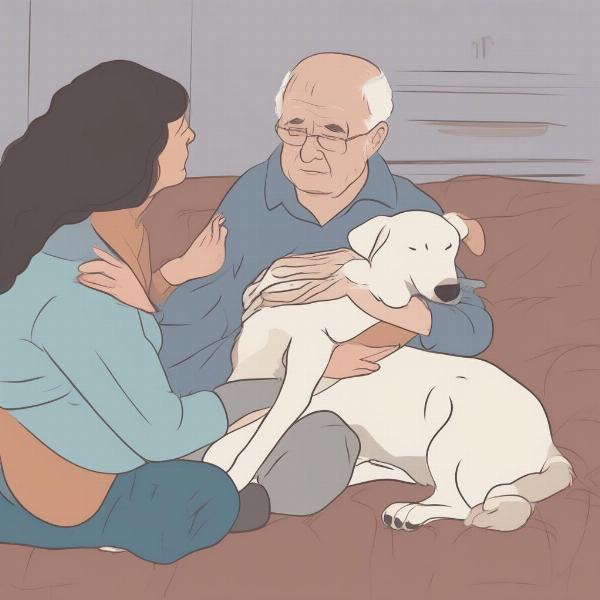Older dogs can experience seizures, which can be a frightening experience for both the dog and the owner. Seizures in older dogs are often a symptom of underlying health issues, and understanding the causes, symptoms, and treatment options is crucial for providing the best possible care. This article provides a comprehensive guide to seizures in older dogs, covering everything from diagnosis to long-term management.
What Causes Seizures in Older Dogs?
Several factors can contribute to seizures in older dogs. Some of the most common causes include:
- Brain Tumors: Growths within the brain can disrupt normal brain function, leading to seizures.
- Metabolic Disorders: Conditions like kidney or liver disease can affect the brain’s chemical balance, triggering seizures.
- Stroke: Interrupted blood flow to the brain can cause seizures, similar to what happens in humans.
- Idiopathic Epilepsy: In some cases, the cause of seizures remains unknown, and this is referred to as idiopathic epilepsy. This is often diagnosed after other potential causes have been ruled out.
- Trauma: Head injuries, even those from years past, can sometimes lead to seizures later in life.
- Exposure to Toxins: Certain toxins, such as insecticides or rodenticides, can cause seizures.
Recognizing the Signs of a Seizure
Recognizing the signs of a seizure is critical for timely intervention. Seizures can manifest in various ways, ranging from subtle twitching to full-body convulsions. Common signs include:
- Muscle Twitching or Jerking: This can be localized to one area of the body or involve the entire body.
- Stiffening of the Body: The dog’s body may become rigid and unmoving.
- Loss of Consciousness: The dog may appear unresponsive to external stimuli.
- Paddling Motions of the Legs: This can resemble a swimming motion.
- Excessive Salivation or Foaming at the Mouth: Increased saliva production is common during seizures.
- Loss of Bladder or Bowel Control: This can occur during or after a seizure.
If you notice any of these signs, it’s crucial to remain calm and observe your dog closely. Note the duration of the seizure and any specific behaviors exhibited.
Diagnosing and Treating Seizures
If your older dog experiences a seizure, consult your veterinarian immediately. They will perform a thorough physical examination and may recommend further diagnostic tests, such as blood work, urine analysis, and possibly an MRI or CT scan to identify the underlying cause. older dogs and seizures provides more detailed information on this specific topic.
Treatment for seizures typically involves anticonvulsant medications to reduce the frequency and severity of seizures. The specific medication and dosage will depend on the underlying cause and the individual dog’s response to treatment. pjs dogs offers insights into other health concerns in older dogs.
Managing Seizures at Home
Once your dog is diagnosed and on medication, you can take steps at home to help manage their seizures:
- Create a Safe Environment: Remove any potential hazards that could injure your dog during a seizure, such as sharp objects or furniture.
- Maintain a Seizure Log: Record the date, time, duration, and any other details of each seizure to help your veterinarian monitor your dog’s progress.
- Provide a Consistent Routine: A regular schedule for feeding, exercise, and medication can help reduce stress and potentially minimize seizure triggers.
- Communicate with Your Veterinarian: Regularly update your veterinarian on your dog’s condition and any changes in seizure frequency or severity.
 Senior Dog Comfort During Seizure
Senior Dog Comfort During Seizure
“Providing a calm and consistent environment for a senior dog experiencing seizures can significantly improve their quality of life,” says Dr. Emily Carter, DVM, a veterinary neurologist.
Living with a Senior Dog with Seizures
While a diagnosis of seizures can be concerning, many older dogs can live long and happy lives with proper management. Regular veterinary check-ups, consistent medication, and a supportive home environment are essential for maximizing their well-being. “Remember, you are not alone. Many resources and support groups are available to help you navigate the challenges of caring for a senior dog with seizures,” adds Dr. Carter. calcium powder for dogs might be helpful for supporting overall health. Additionally, simparica trio chewable tablets for dogs offers preventative care against parasites which can sometimes exacerbate underlying health issues.
Conclusion
Seizures in older dogs can be a complex issue, but with proper diagnosis, treatment, and management, many dogs can enjoy a good quality of life. Understanding the causes, recognizing the signs, and working closely with your veterinarian are key to providing the best possible care for your senior companion. can dogs eat peanut butter cookies addresses another common concern for dog owners, reminding us to pay attention to dietary needs especially in senior dogs.
FAQ
- What should I do if my dog has a seizure? Remain calm, observe the seizure, ensure your dog is safe from harm, and contact your veterinarian immediately.
- Are seizures painful for dogs? While dogs may appear distressed during a seizure, they are generally not conscious or experiencing pain.
- How long do seizures typically last? Most seizures last for a few minutes or less.
- Can seizures be cured in older dogs? While the underlying cause may be treatable, seizures themselves are often managed rather than cured.
- What are the long-term effects of seizures in dogs? The long-term effects can vary depending on the underlying cause and the severity of the seizures.
- Can diet affect seizures in dogs? In some cases, dietary changes may be recommended to support overall health and manage seizures.
- Are there any alternative therapies for seizures in dogs? Discuss any alternative therapies with your veterinarian before implementing them.
ILM Dog is a leading online resource for dog owners worldwide, offering expert advice on all aspects of dog care and wellbeing. From breed selection and health care to training, nutrition, and grooming, ILM Dog provides practical and reliable information to help you give your furry friend the best possible care. For further assistance, contact us via email at [email protected] or phone at +44 20-3965-8624.